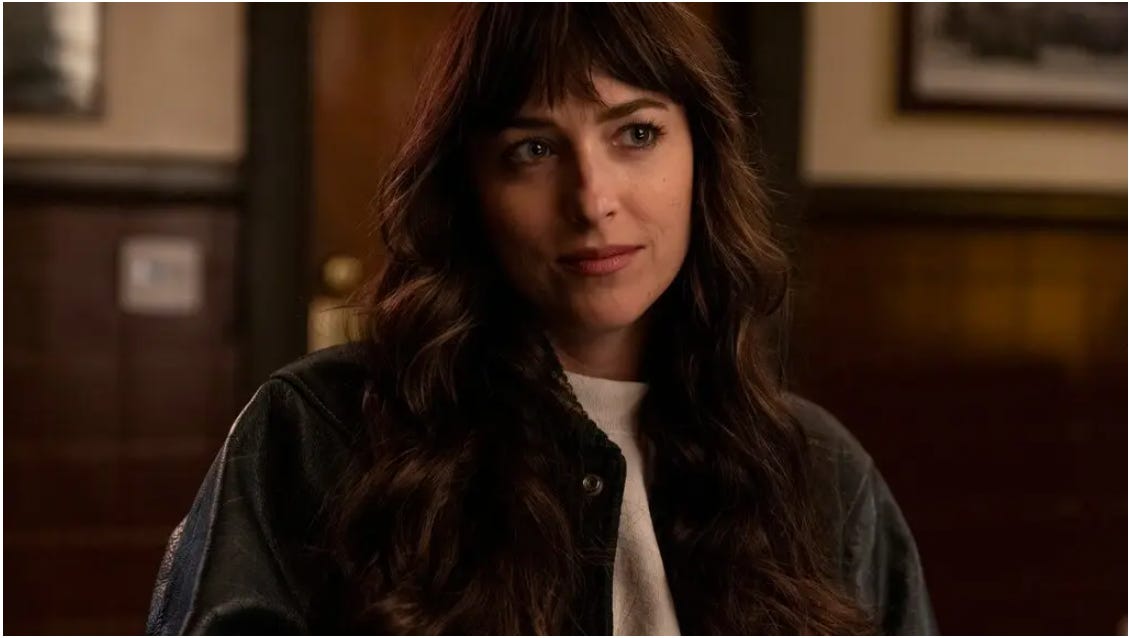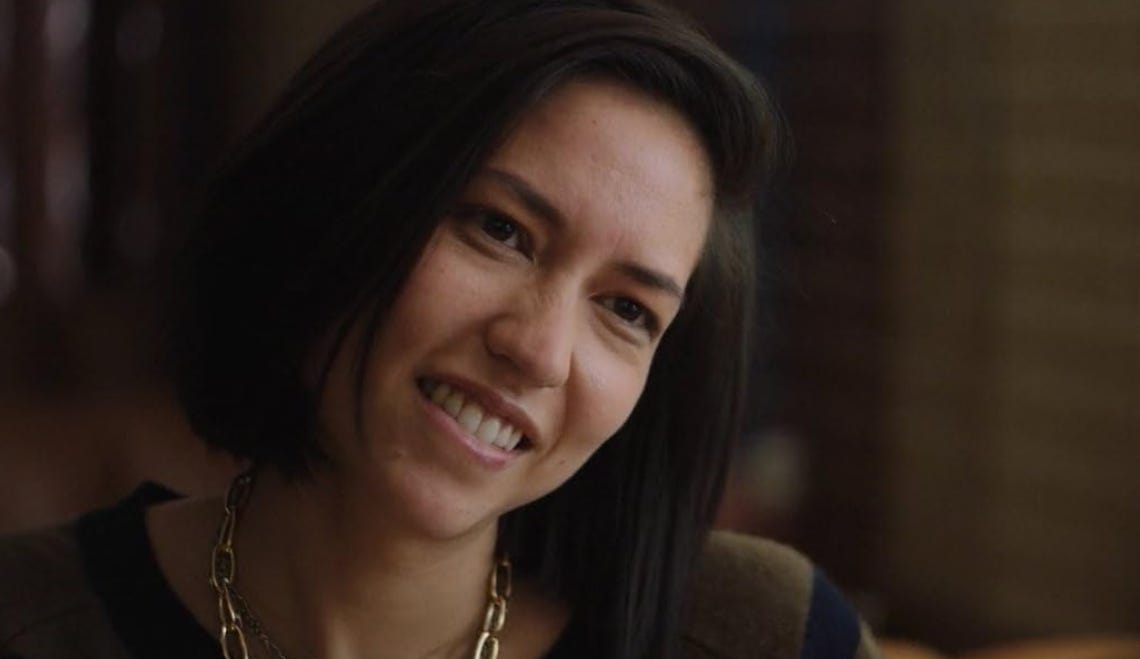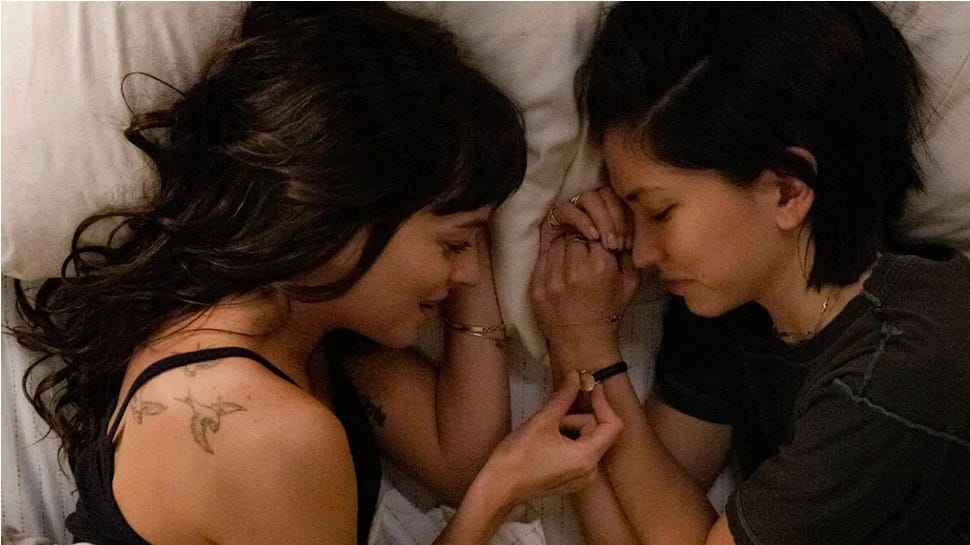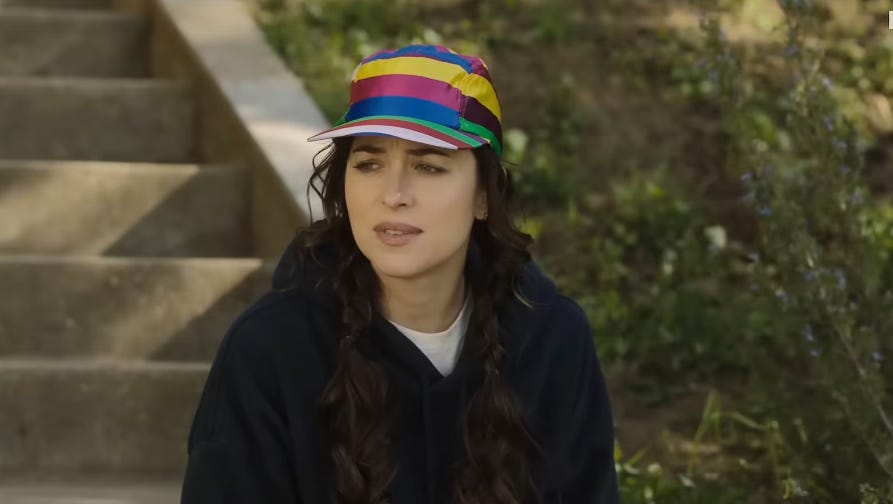Directed: Tig Notaro and Stephanie Allynne
Written: Lauren Pomerantz
Apparently, the answer to did we need another coming out film was yes, at least to first time directors Tig Notaro and Stephanie Allynne. I can see why they thought so, but like many other films of its ilk it feels seriously dated the second it lands on your streamer.
This works far better as an exploration of female friendship rather than the promised quirky coming out adventure or exploration of queerness in your thirties that is in all the promos. Every woman who has a best friend (especially the gay and straight best friend combo) knows it can be one of the simplest and yet most complicated relationships you have.
Jane (Sonoya Mizuno) and Lucy (Dakota Johnson) are in their early thirties and are longtime best friends. Jane is a successful career woman on the rise, while Lucy has sublimated her artistic talents in a dead-end job as a receptionist for a masseuse. We find out quickly that they are each other’s opposites in so many ways, but their knowledge of and love for each other is profound.
When Lucy finally admits to Jane that she might be gay, that throws Jane for a loop. How could she not have known this fundamental thing about her best friend? She attempts to overcompensate by becoming the greatest, more queer-friendly advocate ever, going so far as to kiss a stranger in a gay bar (a cringey, wasted cameo from ER Fightmaster) which just goes to show how self-centred she is. The strain of Lucy’s prevarication versus Jane’s straightforward approach to getting what you want pushes their friendship to its limits.
Lucy is profoundly boring. She lives a quiet, staid life, where she orders the same food at the same diner every day, and doesn’t have the courage to pursue her passions. Being a lesbian is the first interesting thing she’s ever done. Lucy attempts first to date women, and then to pursue a thing with one of the massage therapists in her practice who thinks she might be bi.
You’re fully permitted to scream “no! that’s the worst idea ever!” pantomime-like at the screen at this point. It is a bad idea, and honestly not sexy at all. Dakota Johnson attempts to portray Lucy’s discomfort in herself by being physically clumsy, but it’s so overdone as to feel like you’re being hit over the head repeatedly with something heavy.
Lucy’s art is mostly a badly disguised metaphor for sexuality and self-knowledge. As she begins to come out and know herself, mostly off the back of her sexual awakening, her art begins to bloom again. She quits her job (yet can still afford her fabulous, quirky little apartment, I really really hate that trope) and dives into her art, finding self-expression and peace for the first time in her adult life.
The absolute stupidest storyline of the film involves Jane trying to move on from her best friend and landing at a retreat where she’s encouraged to scream by a ridiculous therapist, thoroughly overplayed by Tig Notaro.
If all that sounds a bit trite and dull, you’re not wrong. If the real love story here is between the quirky best friends, that’s okay, but then you need to really lean into that. The banter between them is real, but not funny enough, not deep enough. Jane is wasted, and her psychology is too shallow. Their conflict is dumb. They split over traits that they would have known perfectly well each other had if their friendship was as strong as we’re led to believe.
If you are reading this and think you’ve seen it all before, you really have. If you’re a die-hard fan of Notaro, Johnson, or Mizuno you might watch this just to say you’ve seen that odd queer film they all made together, but this is a classic case of a vanity project gone wrong, and it offers nothing new to an audience starving for original lesbian stories. The performances are fine, especially Dakota Johnson, but the writing is not.
This reminds me of star-studded vanity projects of times past when a bunch of friends get together to try and tell a personal story. It almost never works, because in their earnestness they forget that the number one thing that’s needed is a good script that is authentic to your queer audience, not playing to the (straight) cheap seats on a bland streamer. I’ve read a lot of straight reviewers who loved this. They’re wrong.







